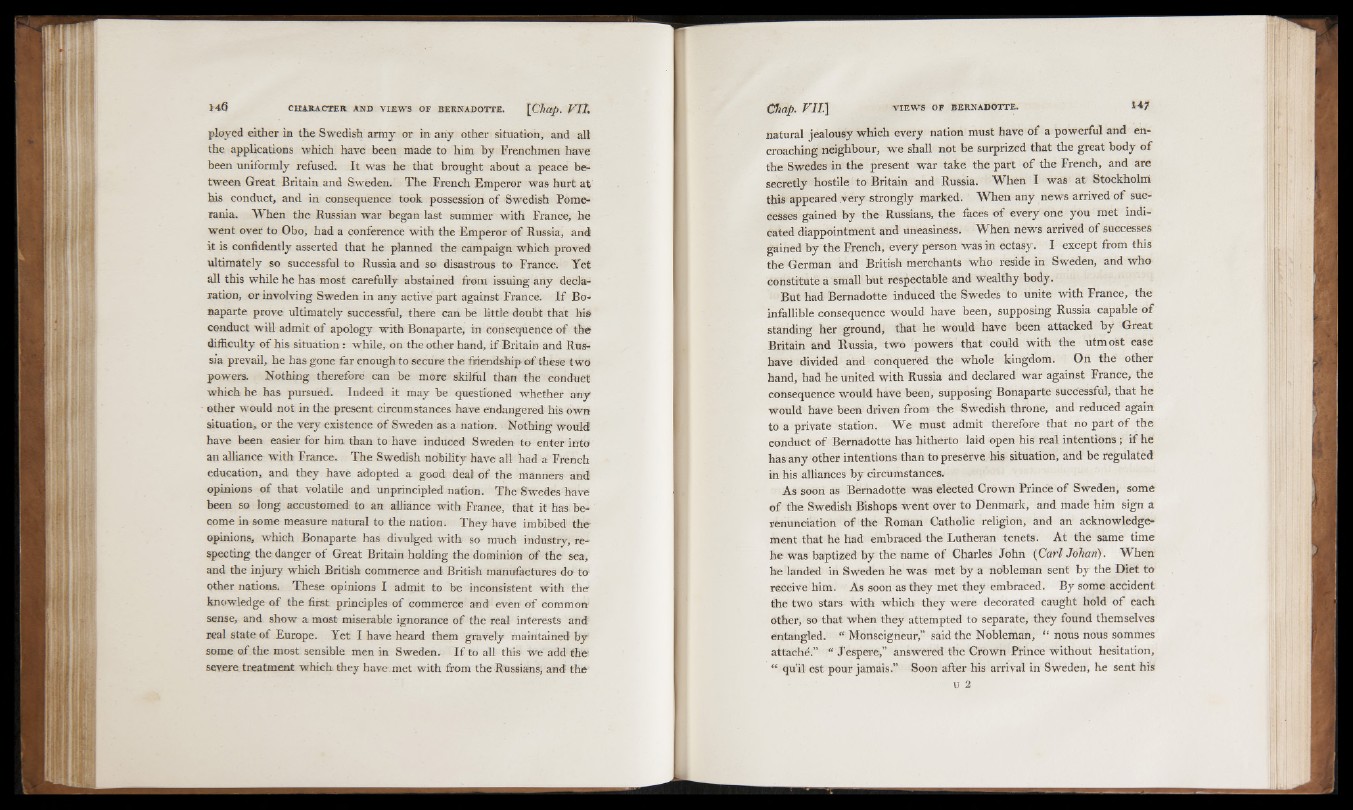
ployed either in the Swedish army or in any other situation, and all
the applications which have been made to him by Frenchmen have
been uniformly refused. It was he that brought about a peace between
Great Britain and Sweden. The French Emperor was hurt at
his conduct, and in consequence took possession o f Swedish Pomerania.
When the Russian war began last summer with France, he
went over to Obo, had a conference with the Emperor o f Russia, and
it is confidently asserted that he planned the campaign which proved
ultimately so successful to Russia and so disastrous to France. Yet
all this while he has most carefully abstained from issuing any declaration,
or involving Sweden in any active part against France. I f Bonaparte
prove ultimately successful, there can be little doubt that his
conduct will admit of apology with Bonaparte, in consequence of the
difficulty o f his situation: while, on the other hand, i f Britain and Russia
prevail, he has gone far enough to secure the friendship of these two
powers. Nothing therefore can be more skilful than the conduct
which he has pursued. Indeed it may be questioned whether any
other would not in the present circumstances have endangered his own
situation, or the very existence o f Sweden as a nation. Nothing would
have been easier for him than to have induced Sweden to enter into
an alliance with France. The Swedish nobility have all had a French
education, and they have adopted a good deal o f the manners and
opinions o f that volatile and unprincipled nation. The Swedes have
been so long accustomed to an alliance with France, that it has become
in some measure natural to the nation. They have imbibed the-
opinions, which Bonaparte has divulged with- so much industry, respecting
the danger o f Great Britain holding the dominión o f the sea,
and the injury which British commerce and British manufactures do- to
other nations. These opinions I admit to be inconsistent with the
knowledge of the first principles of commerce and even o f common-
sense, and show a mast miserable ignorance of the real interests and
real state of Europe. Yet I have heard them gravely maintained by
some o f the most sensible men in Sweden. I f to all this we add the
severe treatment which, they have met with from the Russians, and the
natural jealousy which every nation must have o f a powerful and encroaching
neighbour, we shall not be surprized that the great body of
the Swedes in the present war take the part o f the French, and are
secretly hostile to Britain and Russia. When I was at Stockholm
this appeared very strongly marked. When any news arrived o f successes
gained by the Russians, the faces o f every one you met indicated
diappointment and uneasiness. When news arrived o f successes
gained by the French, every person was in ectasy. I except from this
the German and British merchants who reside in Sweden, and who
constitute a small but respectable and wealthy body.
But had Bernadotte induced the Swedes to unite with France, the
infallible consequence would have been, supposing Russia capable o f
standing her ground, that he would have been attacked by Great
Britain and Russia, two powers that could with the utmost ease
have divided and conquered the whole kingdom. On the other
band, had he united with Russia and declared war against France, the
consequence would have been, supposing Bonaparte successful, that he
would have been driven from the Swedish throne, and reduced again
to a private station. W e must admit therefore that no part o f the
conduct o f Bernadotte has hitherto laid open his real intentions ; i f he
has any other intentions than to preserve his situation, and be regulated
in his alliances by circumstances.
As soon as Bernadotte was elected Crown Prince o f Sweden, some
of the Swedish Bishops went over to Denmark, and made him sign a
renunciation of the Roman Catholic religion, and an acknowledgement
that he had embraced the Lutheran tenets. At the same time
he was baptized by the name o f Charles John (Carl Johan). When
he landed in Sweden he was met by a nobleman sent by the Diet to
receive him. As soon as they met they embraced. By some accident
the two stars with which they were decorated caught hold o f each
other, so that when they attempted to separate, they found themselves
entangled. “ Monseigneur,” said the Nobleman, “ nous nous sommes
attaché.” “ J’espere,” answered the Crown Prince without hesitation,
“ quii est pour jamais.” Soon after his arrival in Sweden, he sent his
u 2